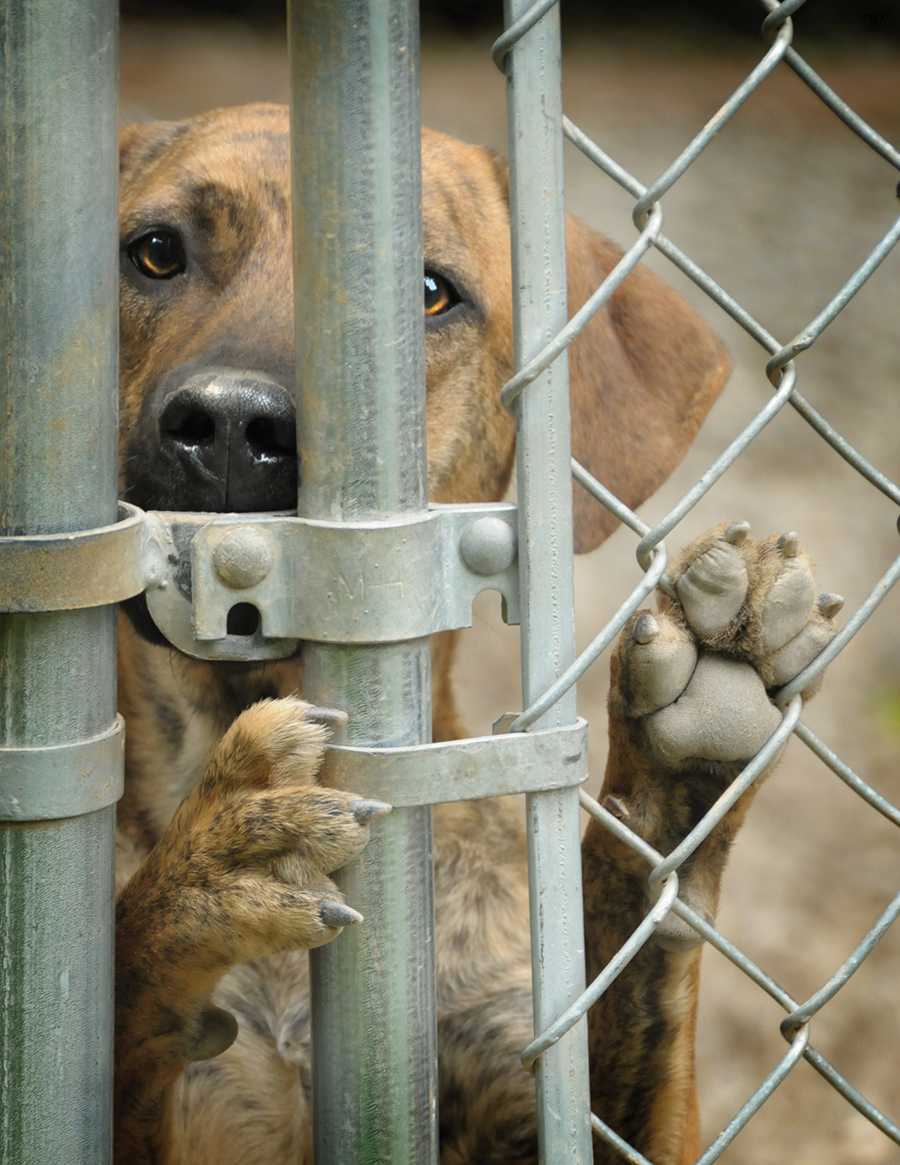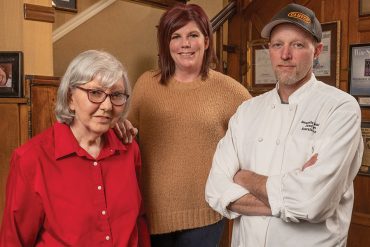Almost entirely run by volunteers, Huntington’s only no-kill animal shelter dedicates every day to saving the ives of our four-legged friends.
By Katherine Reasons-Pyles
HQ 68 | SUMMER/AUTUMN 2009
Teddi, a boxer mix, was only 3 years old and literally starving to death when she was picked up by volunteers with Little Victories Animal Rescue Group. Someone had called the organization after seeing her cross a busy highway, dodging cars in both directions. On one side of the highway was a grocery store. On the other side was an abandoned barn.
When the volunteers arrived, they discovered five puppies underneath the barn and realized that Teddi was starving herself, and risking her life on the highway every day, in order to save her babies. They immediately took the dogs to a veterinarian for treatment.
The puppies were quickly adopted after arriving at Little Victories. Years later, however, Teddi still had not found a home.

“We nicknamed her Grandma,” said Sue Brown, founder and president of Little Victories, “obviously because she had been with us for so long, but also because she kept her kennel so tidy. She had such a funny personality.”
After five years – the longest amount of time Little Victories has had to keep any animal – Teddi finally found her “forever home” with Little Victories volunteer Joe Barker.
Teddi is one of thousands of animals that have been rescued by Little Victories, the only no-kill animal shelter in the Huntington area. It was founded in the spring of 2003, just weeks after the death of Brown’s cocker spaniel Chloe. What began as a brainstorming session among four friends in Brown’s living room now includes more than 300 volunteers as part of the Little Victories mission.

“When people volunteer, they know that they are a part of something that is saving lives,” said Jennifer Holley, Little Victories vice president. Holley joined the Little Victories team six years ago, when it was still in its initial planning phase. Her three dogs are all Little Victories rescues.
Barbara Tzankoff said she decided to help Little Victories several years ago after seeing the organization host a fundraiser walk at Ritter Park. Since then, she has adopted five dogs from Little Victories and fostered countless others until they were able to find their “forever homes.” She coordinates many of the organization’s fundraisers, including bingo tournaments and rummage sales.
One of Tzankoff’s chocolate cocker spaniels, Fudgie, was so disease-ridden that her rescuers were not even sure she was a dog when they found her in Chesapeake, Ohio. She had lost all of her fur and was completely blind, and it took three months of veterinary care to make her healthy again.
“Fudgie is such a sweetheart, but people just don’t want to adopt blind dogs,” Tzankoff said. “She had many medical problems when we found her, and she still does. But she has a home now, and she’s happy when she sleeps at night and has a full tummy.”

Providing veterinary care to sick and injured animals like Fudgie is one of Little Victories’ most expensive operations. Brown said the organization’s vet bills are between $6,000 and $8,000 every month, sometimes reaching as high as $10,000 when an animal needs intensive surgery.
“We have been so blessed with the trust of our community, and we would never do anything to betray that trust,” Brown said. “So, we spay and neuter all the animals, we pay for their medicines and vaccinations and we provide whatever surgeries they need. We will never put an animal down for any reason, unless it has a terminal illness causing it to suffer.”
Regardless of how Little Victories expands and evolves, its mission statement remains the same – to actively search for and provide sanctuary to homeless, injured, abused and abandoned animals. With the help of several generous donations, Little Victories was able to purchase 115 acres of land in 2007 in Ona, W.Va., providing shelter to 80-90 dogs. However, around 40 dogs and 40 cats remain in foster homes, and the shelter must turn away animals on a daily basis.
“We have our land, but it’s not yet what we want it to be. We want a garden, a place for education – we don’t want to be a warehouse for animals,” Brown said. “Our top priority at Little Victories is to build an indoor shelter, where the animals and kennel workers can work and play away from the elements.”
Little Victories has received a generous donation that will pay for the construction of one of the shelter’s two buildings. However, the shelter’s main building still lacks funding; it will cost at least $400,000 to build. Brown said one of the obstacles faced by Little Victories is that people often forget about the importance of donating money to animal rescue groups.
“We give money to every area in life – medicine, education, the arts. There is no more beautiful piece of art than an animal,” she said. “To watch an animal recover from starvation or illness and become once again a beautiful creature with shining hair and eyes – that’s true artwork.”
If the animals are artwork, then volunteers like Brown, Holley, Tzankoff and “Cat Coordinator” Vickie Black are the artists, working with passion and urgency to give a good home to each stray animal they find.
“When they come up to you and put their paws around your neck and kiss your nose, you just melt,” said Black, who cares for nearly 30 cats and kittens in her home. Black said she loves what she is able to do with Little Victories, but the organization needs many more foster parents, donors and volunteers to help carry out its work.
“We are fortunate to have a place like Little Victories to stop the killing in the area,” she said, “but until we get our shelter or more foster homes, we are at a standstill. We have had to turn away a tremendous number of cats and dogs this year.”
While the Little Victories staff and volunteers may have different opinions on the prettiest dog breed, or whether kittens or puppies are more fun to be around, there is one thing that they all feel is of utmost importance. They believe that the solution to animal homelessness is as simple as teaching pet owners to act responsibly by spaying and neutering their animals. The Humane Society estimates that 3-4 million cats and dogs are euthanized by shelters each year to make room for new animals; with spaying and neutering, that number would decrease drastically.
“The biggest problem in our area is a lack of education. People just don’t realize how important it is to spay and neuter their pets,” Brown said. “If everyone spayed and neutered, our problems would be solved. That’d be it.”

Brown said there are nonprofit spay/neuter clinics in the Huntington area that offer low rates, and many local vets are beginning to match their prices. The cost to spay and neuter ranges from $20 to more than $100.
“There is an urgency to this issue. The longer it takes us to accomplish our goals, the more animals die,” Brown said. “It’s overwhelming, but we just have to look ahead, to the point where there is no more animal homelessness.” Brown added that shelters in West Virginia alone euthanize around 100,000 animals every year.
“Some day, when everything is done, I want to be the crazy old lady that comes to Little Victories just to play with the puppies,” she said. “I hope that will happen in my lifetime, but I don’t know. We have a lot to do.”
For Brown and the hundreds of other volunteers working toward ending animal homelessness in our area, their motivation lies in the support of the community and the work they are able to accomplish – one animal at a time.
“Watching an emaciated dog or cat transform in front of our eyes, and one day seeing him run up to us as a healthy animal with shiny hair – that’s our reward,” Brown said. “And the way we get paid is puppy kisses.”
How You Can Help
Helping Little Victories can be as simple as donating food or money or as involved as fostering a cat or dog in your home until it is adopted. Other volunteer opportunities include sitting with the animals at adopt-a-thons and working at fundraiser events.
Volunteer applications are available online at the Little Victories Web site (www.littlevictories.org), and donations can be mailed to
Little Victories Animal Rescue
P.O. Box 247
Barboursville, WV 25504.





